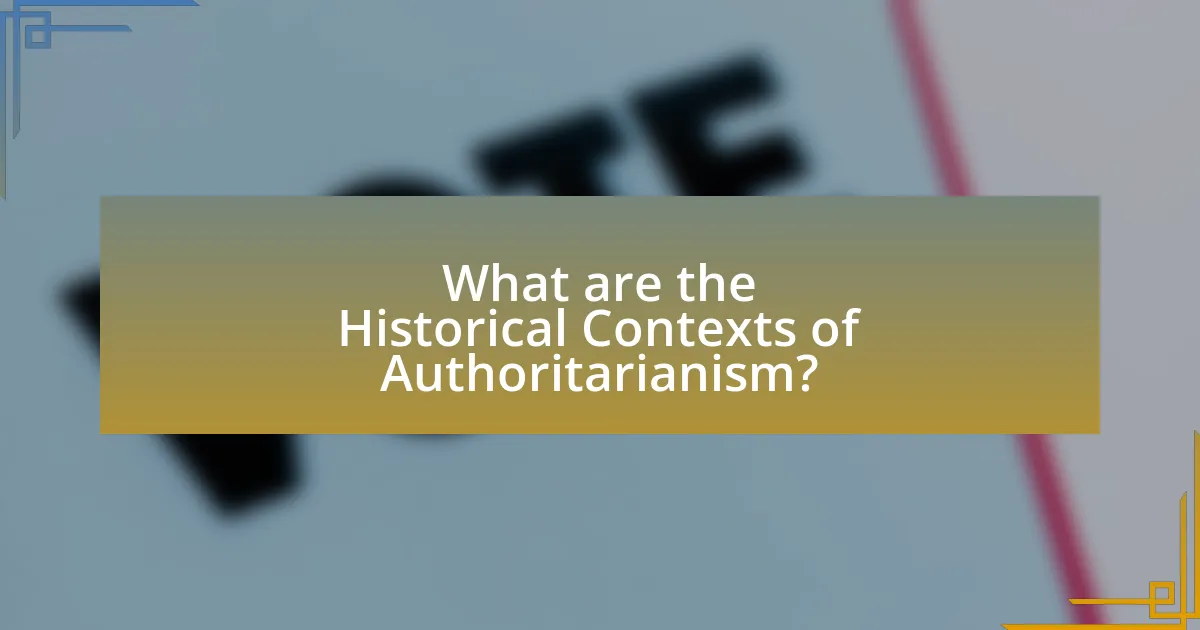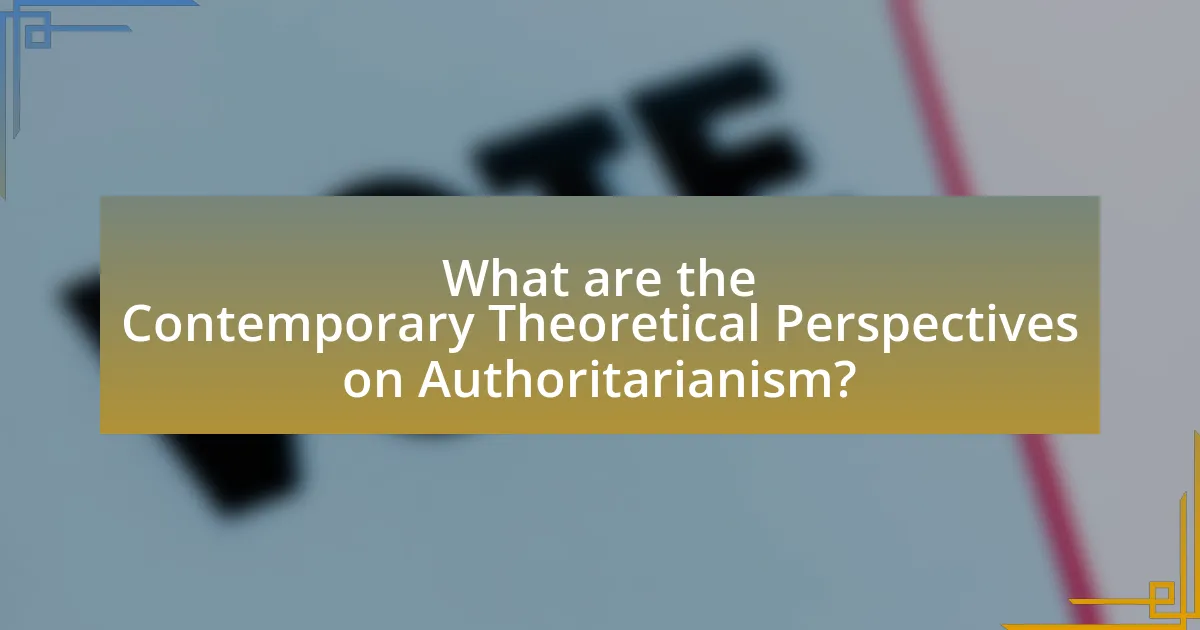The article examines the theoretical foundations of authoritarianism, exploring its roots in political theory, sociology, and psychology. It defines authoritarianism as a governance system characterized by centralized power, limited political pluralism, and the suppression of dissent, while contrasting it with totalitarianism. Key characteristics of authoritarian regimes, historical contexts influencing their emergence, and socio-economic factors contributing to their persistence are discussed. The article also highlights contemporary theoretical perspectives, the implications of authoritarianism for global politics, and strategies to counteract its influence, emphasizing the role of civil society and international pressure in promoting democratic values.

What are the Theoretical Foundations of Authoritarianism?
The theoretical foundations of authoritarianism are primarily rooted in political theory, sociology, and psychology. Authoritarianism is characterized by the concentration of power in a leader or an elite not accountable to the public, often justified by the need for order, stability, and national security. Key theories include the elite theory, which posits that a small group of elites holds power and makes decisions for the larger population, and the social contract theory, which suggests that individuals consent to surrender some freedoms to a governing authority in exchange for protection and order. Historical examples, such as the rise of fascism in the early 20th century, illustrate how these theories manifest in practice, as authoritarian regimes often emerge during times of crisis when citizens prioritize security over democratic freedoms.
How do different political theories define authoritarianism?
Different political theories define authoritarianism as a system of governance characterized by the concentration of power in a single authority or a small group, limiting political pluralism and individual freedoms. For instance, classical liberalism views authoritarianism as a violation of individual rights and freedoms, emphasizing the importance of democratic governance and civil liberties. In contrast, Marxist theory interprets authoritarianism as a necessary phase in the transition to socialism, where the state exerts control to dismantle capitalist structures. Furthermore, conservative theories often see authoritarianism as a means to maintain social order and stability, prioritizing collective security over individual freedoms. Each of these perspectives highlights distinct aspects of authoritarianism, illustrating its multifaceted nature in political discourse.
What are the key characteristics of authoritarian regimes?
Authoritarian regimes are characterized by centralized control, limited political pluralism, and the suppression of dissent. These regimes often maintain power through coercive means, such as state violence, censorship, and propaganda, which restrict individual freedoms and political opposition. For instance, countries like North Korea exemplify these traits, where the ruling party monopolizes political power and dissent is met with severe punishment. Additionally, authoritarian regimes typically lack democratic institutions, leading to a concentration of power in the hands of a single leader or a small elite, as seen in Russia under Vladimir Putin, where political competition is stifled and media is heavily controlled.
How do authoritarianism and totalitarianism differ?
Authoritarianism and totalitarianism differ primarily in the extent of government control over public and private life. Authoritarianism allows for some individual freedoms and limited pluralism, whereas totalitarianism seeks to control all aspects of life, including the economy, education, and personal beliefs. Historical examples illustrate this distinction: authoritarian regimes, such as those in Spain under Franco, maintained a degree of social and economic autonomy, while totalitarian regimes, like Stalin’s Soviet Union, demanded absolute loyalty and conformity, suppressing dissent and controlling all societal institutions.
Why is it important to study the theoretical foundations of authoritarianism?
Studying the theoretical foundations of authoritarianism is crucial for understanding the mechanisms that enable and sustain authoritarian regimes. This understanding allows scholars and policymakers to identify patterns of governance, control, and resistance within such systems. For instance, the works of political theorists like Hannah Arendt and Carl Friedrich provide insights into the nature of power and authority, illustrating how authoritarianism can emerge from democratic contexts. Additionally, empirical studies, such as those by Freedom House, show that countries with weak democratic institutions are more susceptible to authoritarianism, highlighting the importance of theoretical frameworks in predicting and analyzing political behavior.
What insights can be gained from understanding authoritarianism?
Understanding authoritarianism provides insights into the mechanisms of power concentration and the erosion of democratic norms. By analyzing historical and contemporary authoritarian regimes, one can identify patterns such as the suppression of dissent, control of media, and manipulation of electoral processes. For instance, the rise of authoritarian leaders often correlates with economic instability and social unrest, as seen in countries like Venezuela and Hungary. These insights reveal how authoritarianism can undermine civil liberties and promote a culture of fear, ultimately affecting societal cohesion and governance.
How does the study of authoritarianism inform contemporary political analysis?
The study of authoritarianism informs contemporary political analysis by providing frameworks to understand the dynamics of power, governance, and citizen-state relations in non-democratic regimes. This analysis reveals how authoritarian leaders maintain control through mechanisms such as propaganda, repression, and co-optation, which are critical for assessing the stability and resilience of such regimes. For instance, research by Levitsky and Way in “Competitive Authoritarianism: Hybrid Regimes After the Cold War” illustrates how hybrid regimes blend democratic and authoritarian elements, influencing political behavior and institutional development. Understanding these frameworks allows analysts to predict regime durability and the potential for democratic transitions, thereby enhancing the comprehension of global political trends.

What are the Historical Contexts of Authoritarianism?
Authoritarianism has historical contexts rooted in various political, social, and economic conditions that have shaped its emergence. Key historical contexts include the aftermath of World War I, where instability and economic hardship led to the rise of totalitarian regimes in Europe, such as Fascism in Italy and Nazism in Germany. Additionally, the Cold War period saw authoritarianism flourish in various regions as superpowers supported dictatorial regimes to counter communism, exemplified by U.S. backing of authoritarian governments in Latin America. Furthermore, colonial legacies and post-colonial struggles often resulted in authoritarian rule as newly independent states grappled with governance challenges. These contexts illustrate how authoritarianism can arise from crises, ideological battles, and historical legacies, reinforcing its complex nature in global politics.
How have historical events shaped authoritarian regimes?
Historical events have significantly shaped authoritarian regimes by providing the context and justification for their emergence and consolidation. For instance, the aftermath of World War I led to the rise of totalitarian regimes in Europe, as economic instability and social unrest created fertile ground for leaders like Mussolini and Hitler to exploit national grievances and establish dictatorial control. Additionally, the Cold War era saw the proliferation of authoritarian regimes in various regions, as superpowers supported authoritarian governments to counter perceived threats, exemplified by U.S. backing of regimes in Latin America and the Middle East. These historical contexts illustrate how crises, wars, and geopolitical strategies have directly influenced the formation and durability of authoritarian governance.
What role did the Cold War play in the rise of authoritarianism?
The Cold War significantly contributed to the rise of authoritarianism by fostering geopolitical tensions that allowed authoritarian regimes to consolidate power under the guise of anti-communism. During this period, both the United States and the Soviet Union supported authoritarian governments as a means to counteract the influence of the opposing ideology, leading to military and economic aid for regimes that suppressed dissent. For instance, U.S. support for authoritarian leaders in Latin America, such as Augusto Pinochet in Chile, was justified as necessary to prevent the spread of communism, which ultimately enabled these leaders to maintain oppressive control over their populations. This dynamic created a global environment where authoritarianism was often viewed as a legitimate response to perceived threats, thereby facilitating its rise in various regions around the world.
How do colonial histories influence modern authoritarian states?
Colonial histories significantly influence modern authoritarian states by establishing legacies of centralized power and governance structures that prioritize control over democratic processes. Many contemporary authoritarian regimes emerged from colonial rule, where colonial powers imposed hierarchical systems that often suppressed local governance and civil liberties. For instance, countries like Algeria and Angola, which experienced prolonged colonial domination, transitioned into authoritarian regimes that mirrored the oppressive tactics of their colonial rulers, such as censorship and political repression. This historical context creates a continuity of authoritarian practices, as leaders in these states often utilize similar methods of control to maintain power, reflecting the colonial legacy of prioritizing state authority over individual rights.
What are the socio-economic factors contributing to authoritarianism?
Socio-economic factors contributing to authoritarianism include economic inequality, lack of education, and unemployment. Economic inequality creates social divisions and fosters resentment, which authoritarian regimes exploit to consolidate power. For instance, countries with high income disparity, such as Brazil and South Africa, have seen a rise in authoritarian tendencies as elites manipulate discontent among the lower classes. Lack of education limits critical thinking and civic engagement, making populations more susceptible to authoritarian ideologies. Research by the World Bank indicates that lower education levels correlate with higher support for authoritarian governance. Additionally, high unemployment rates can lead to social unrest, prompting citizens to seek stability through authoritarian leadership, as observed in the Arab Spring where economic grievances fueled support for authoritarian figures.
How does economic inequality foster authoritarian governance?
Economic inequality fosters authoritarian governance by creating social divisions that undermine democratic institutions and promote the concentration of power. When wealth is unevenly distributed, the elite can manipulate political systems to maintain their status, often leading to policies that suppress dissent and limit political participation. For instance, research by Piketty in “Capital in the Twenty-First Century” highlights how economic disparities can lead to political capture, where wealthy individuals influence legislation to protect their interests, thereby eroding democratic norms. Additionally, high levels of inequality can result in social unrest, prompting governments to adopt authoritarian measures to maintain control and stability, as seen in various countries during economic crises.
What impact do social movements have on authoritarian regimes?
Social movements significantly challenge authoritarian regimes by mobilizing public dissent and fostering collective action. These movements often expose governmental repression and demand political change, leading to increased pressure on authoritarian leaders. Historical examples include the Arab Spring, where widespread protests led to the ousting of several long-standing dictators, demonstrating that organized social movements can destabilize entrenched power structures. Additionally, social movements can inspire solidarity among various societal groups, amplifying their impact and creating a broader coalition for change, as seen in the civil rights movements across different countries.

What are the Contemporary Theoretical Perspectives on Authoritarianism?
Contemporary theoretical perspectives on authoritarianism include the structural, cultural, and psychological approaches. The structural perspective emphasizes the role of political institutions and economic conditions in fostering authoritarian regimes, suggesting that weak institutions and economic instability can lead to authoritarian governance. The cultural perspective focuses on the influence of societal values and norms, arguing that cultures with high levels of collectivism and low tolerance for dissent are more likely to support authoritarianism. The psychological perspective examines individual attitudes and behaviors, positing that personality traits such as authoritarianism can predispose individuals to support authoritarian leaders. These perspectives are supported by empirical research, such as studies showing correlations between economic crises and the rise of authoritarian regimes, as well as surveys indicating that cultural attitudes significantly impact political preferences.
How do modern theorists conceptualize authoritarianism?
Modern theorists conceptualize authoritarianism as a political system characterized by the concentration of power in a single authority, often marked by limited political pluralism and the suppression of dissent. This conceptualization is supported by the work of theorists like Juan J. Linz, who identified key features of authoritarian regimes, including the absence of democratic accountability, the use of coercion, and the manipulation of political institutions to maintain control. Additionally, contemporary analyses emphasize the role of ideology and state capacity in sustaining authoritarian governance, as seen in the research by Steven Levitsky and Lucan A. Way, which highlights the importance of state strength and the strategies employed by authoritarian leaders to consolidate power.
What are the main schools of thought in contemporary authoritarian studies?
The main schools of thought in contemporary authoritarian studies include the classical authoritarianism perspective, the competitive authoritarianism framework, and the hybrid regime analysis. The classical authoritarianism perspective focuses on the characteristics and mechanisms of traditional authoritarian regimes, emphasizing the role of state repression and elite control. The competitive authoritarianism framework, introduced by Levitsky and Way, examines regimes that hold elections but manipulate them to maintain power, highlighting the interplay between democratic and authoritarian elements. The hybrid regime analysis explores the complexities of political systems that exhibit both democratic and authoritarian traits, often leading to instability and conflict. These frameworks are supported by empirical studies that illustrate the varying degrees of authoritarian practices across different countries and contexts.
How do cultural factors influence authoritarian governance today?
Cultural factors significantly influence authoritarian governance today by shaping societal norms, values, and perceptions of authority. In many regions, cultural traditions that emphasize collectivism over individualism foster acceptance of centralized power and hierarchical structures, which can legitimize authoritarian rule. For instance, in countries like China, Confucian values promote respect for authority and social harmony, facilitating the acceptance of the Communist Party’s governance. Additionally, cultural narratives that prioritize stability and security often lead populations to tolerate or even support authoritarian measures, as seen in various Middle Eastern nations where historical experiences of conflict have made citizens more amenable to strong leadership. These cultural dynamics create an environment where authoritarian regimes can thrive, as they align governance with deeply rooted societal beliefs and practices.
What are the implications of authoritarianism for global politics?
Authoritarianism significantly impacts global politics by undermining democratic norms and fostering instability. Authoritarian regimes often prioritize state control over individual freedoms, leading to human rights violations and suppression of dissent. For instance, countries like North Korea and Belarus exhibit how authoritarian governance can isolate nations internationally, resulting in economic sanctions and diplomatic isolation. Furthermore, the rise of authoritarianism can inspire similar governance models in other countries, as seen in the spread of populist leaders who adopt authoritarian tactics, thereby challenging the global democratic order. This trend can destabilize regions, as authoritarian states may engage in aggressive foreign policies, exemplified by Russia’s actions in Ukraine, which have escalated tensions and prompted international responses.
How does authoritarianism affect international relations?
Authoritarianism significantly impacts international relations by fostering instability and conflict. Authoritarian regimes often prioritize regime survival over diplomatic engagement, leading to aggressive foreign policies and militarization. For instance, North Korea’s authoritarian government has pursued nuclear weapons development, resulting in heightened tensions with neighboring countries and the United States. Additionally, authoritarian states may engage in human rights abuses, prompting international sanctions and isolation, as seen with Russia’s actions in Ukraine, which have led to widespread condemnation and economic penalties from Western nations. These dynamics illustrate how authoritarianism can disrupt global cooperation and create adversarial relationships among states.
What strategies do authoritarian regimes use to maintain power?
Authoritarian regimes maintain power through a combination of repression, propaganda, and co-optation. Repression involves the use of state violence, censorship, and surveillance to eliminate dissent and instill fear among the populace, as seen in countries like North Korea and Syria, where governments actively suppress opposition. Propaganda is utilized to control the narrative and promote the regime’s legitimacy, often through state-controlled media that disseminate favorable information while discrediting critics, a tactic employed by regimes such as those in Russia and China. Co-optation refers to the strategy of integrating potential opposition figures into the regime’s structure, thereby neutralizing threats by offering them incentives for compliance, which has been observed in various authoritarian contexts, including Venezuela. These strategies collectively reinforce the regime’s grip on power and hinder democratic movements.
What practical approaches can be taken to counter authoritarianism?
Practical approaches to counter authoritarianism include promoting democratic governance, strengthening civil society, and enhancing political participation. Democratic governance can be fostered through the establishment of transparent electoral processes and the protection of human rights, as evidenced by successful transitions in countries like South Africa post-apartheid. Strengthening civil society involves supporting non-governmental organizations that advocate for accountability and social justice, which has been crucial in countries like Poland during its transition from communism. Enhancing political participation can be achieved by encouraging grassroots movements and civic education, as seen in the Arab Spring, where increased awareness and mobilization challenged authoritarian regimes. These approaches collectively create a resilient framework against authoritarianism by empowering citizens and promoting democratic values.
How can civil society organizations promote democratic values?
Civil society organizations can promote democratic values by advocating for human rights, fostering civic engagement, and holding governments accountable. These organizations often mobilize citizens to participate in democratic processes, such as voting and public discourse, thereby enhancing political participation. For instance, organizations like Amnesty International and Human Rights Watch work to raise awareness about human rights violations, which reinforces the importance of democratic principles. Additionally, research indicates that countries with active civil society organizations tend to have stronger democratic institutions, as these entities provide checks on government power and promote transparency.
What role does international pressure play in challenging authoritarian regimes?
International pressure plays a crucial role in challenging authoritarian regimes by influencing their behavior and promoting democratic reforms. This pressure can manifest through economic sanctions, diplomatic isolation, and public condemnation, which can weaken the legitimacy and stability of authoritarian governments. For instance, the imposition of sanctions on countries like Iran and North Korea has aimed to curb their nuclear ambitions and promote human rights, demonstrating how international actions can compel authoritarian leaders to reconsider their policies. Additionally, international organizations and coalitions, such as the United Nations and the European Union, often advocate for democratic governance and human rights, providing a framework for accountability that authoritarian regimes may fear. Historical examples, such as the international response to the apartheid regime in South Africa, illustrate how sustained global pressure can lead to significant political change.


